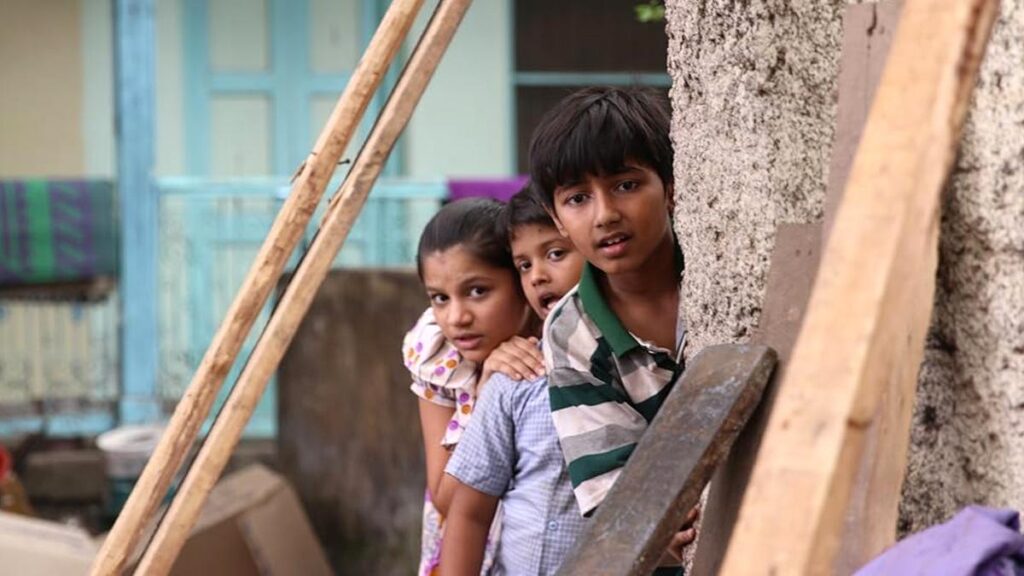The tone of the film may be gloomy but it is never tragic or hopeless.
Like millions of underprivileged people who find joy in small things, Shanu, Bua and their mother keep their heads above water, notes Deepa Gahlot.

The release of this small film, Chidiya, is a story of persistence, quite like the never-say-die spirit of its two young lead characters.
Made in 2016, the film took almost a decade to reach the theatres, and its box office fate is pre-ordained, unless a miracle happens.
‘Making an indie film is hard but releasing it is even harder,’ reads a card handed out at the screening.
That’s so true.
Mehran Amrohi, director and co-writer of Chidiya, is not a complete outsider.
He is related to Pakeezah Director Kamal Amrohi but his career as a filmmaker took a very different route from the mainstream.
Chidiya is set in a Mumbai chawl, where a pre-teen Shanu (Svar Kamble) and his younger brother, Bua (Ayush Pathak), live with their widowed mother, Vaishnavi (Amruta Subhash), struggling to make ends meet. Their kindhearted uncle, Bali (Vinay Pathak) lives a few doors down with his wife and teenage daughter, Ishani (Hetal Gada).
Their mother cannot afford to send them to school, so the kids loiter around all day, and carry to and from the tailor (Inaamulhaq) the saris their mother works on at home.
Bali works as a spot boy with a production company and on Vaishnavi’s ardent request, he takes them to the studio, where he hopes to get them work.
On the day they visit, an actor (Shreyas Talpade) is doing a badminton-playing scene, and the boys are fascinated with the game — they don’t even know what it is called. It quickly borders on obsession when the actor gives Shanu a shuttlecock.
The boys first have to find a place to play — which they do with some difficulty — then somehow acquire the other equipment the game requires, with a lot of jugaad.
But against all labour laws, the two underage boys are employed as tea-servers on the set, as their uncle’s buddy (Brijendra Kala) makes endless glasses of tea for the film crew. They work from dawn to night, and do not have the time to play.
The story is set in a world that’s helpful and generous.
The ‘villain’ is the boys’ poverty that steals even their childish desire to play a sport that is not meant for them.
Like the other chawl kids, they could play gully cricket or other easy games but there is no arguing with a heart that is set on something that is out of reach.
Like the Iranian films about precocious kids that were once all a rage on festival circuits, and slightly reminiscent of the Tamil film Kaakkaa Muttai that was about two slum kids who want to eat pizza, or the Marathi film, Taryanche Bait, in which a child wishes to spend time in a five-star hotel, Chidiya is about ordinary aspirations.
The brothers in Chidiya are disheartened by their circumstances but do not rebel or break the moral code their mother lives by.
Mehran Amrohi builds up the story in a gentle way.
Whenever they are a step closer to their goal, something happens to stop them.
The tone of the film may be gloomy but it is never tragic or hopeless.
Like millions of underprivileged people who find joy in small things, Shanu, Bua and their mother keep their heads above water.
The film is realistic in its approach. There is no foolish optimism, no angel steps in to pull the family out of their dire condition, but they are not crushed by their unfulfilled dreams either.
The three children are talented and act with ease and confidence.
Amruta Subhash and Vinay Pathak as the adults, who want the best for their kids, are endearing too.
In an ideal world, Chidiya, which did not give up on a theatre release, would find an appreciative audience… and hope floats.
Chidiya Review Rediff Rating:



